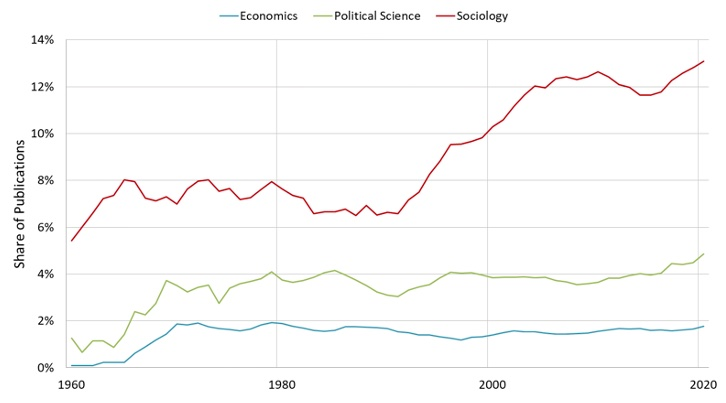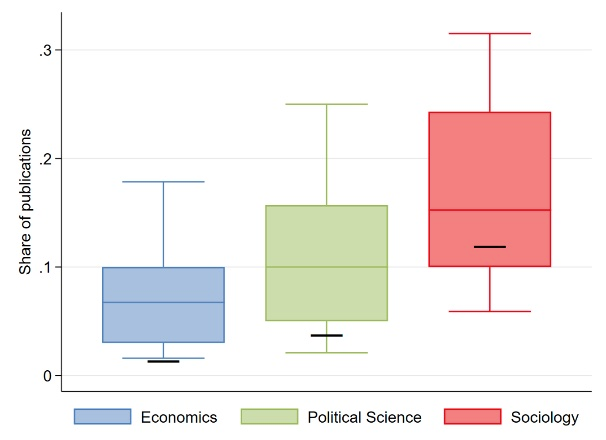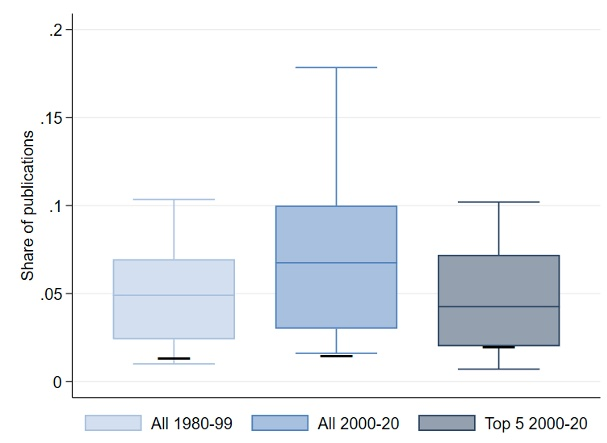In the wake of last summer’s Black Lives Matter protests, many have asked themselves what they are doing to tackle racial injustice. For economists, one central question is the extent to which the profession has examined the causes and consequences of racial inequality. This column reports evidence that race-related research in economic journals constitutes a far lower share than in comparable publications in sociology and political science. What’s more, economists over-estimate the extent of race-related research done by the profession. Understanding why economists produce so little race-related research is essential if the discipline is going to be able to reform.
The murder of George Floyd by a police officer in Minneapolis in May 2020 sparked outrage across the world. The Black Lives Matter protests that followed brought the issues facing ethnic minority individuals to the top of the global news agenda and led many organisations to ask themselves what they are doing to tackle racial injustice.
Academic economics has had its own reckoning, with discussions about what we teach (Alves and Kvangraven 2021, Charles 2021), how we teach (Bayer et al. 2020a) and who is represented (Advani et al. 2019, 2020, Bayer et al. 2020b, Koffi and Wantchekon 2021).
In August 2020, the Econometric Society World Congress convened a panel event to ask: “What can economics do for racial justice?” One clear answer was that alongside the tentative advances in teaching and the pressure to improve representation, economists need to study the causes and consequences of racial inequality (Charles 2021, Cook 2021). In a recent study, we examine how much economists have actually been doing this (Advani et al. 2021).
Using data from over 225,000 academic publications by economists over a 60-year period (1960–2020), we determine what share of research can be classified as ‘race-related’. We develop an algorithm to automatically classify a publication as ‘race-related’ if it contains a group keyword such as ‘African-American’ and a topic keyword such as ‘discrimination’ in the title or abstract. This combination of keywords helps remove false positives (where, for example, a theory publication studying an ‘arms race’ is picked up as race-related).
Figure 1 shows the share of publications in economics that we classify as race-related, over the past 60 years. Since around 1970, this has remained flat, at a little below 2% of all publications in economics. In total, of the nearly quarter of a million publications in economics since 1960, only 3,000 are race-related.
We compare this data to two other social science disciplines: sociology and political science. Both disciplines are similar to economics, in that they cover a relatively broad range of social science issues, but with different methodological approaches. Economics produces far less race-related research in terms of both the absolute number of publications and the share of publications that are race-related. In political science, the share of race-related publications is more than twice that of economics; and in sociology, it is around six times as high.
Figure 1 Share of publications that are race-related, by year and discipline

To understand whether economists are actually aware of how little race-related work they do, we conducted a survey of economists using the Social Science Prediction Platform. We surveyed a mix of academics – recruited via direct emails and Twitter advertising of the poll – and public sector economists recruited via emails to the UK Government Economic Service and the Bank of England internal mailing lists. We gathered a sample of 240 responses from academic and public sector economists in the ten days prior to the Econometric Society World Congress in August 2020. Participants were asked to state their beliefs about:
the share of race-related research in economics in relation to other disciplines;
how the share of race-related research in economics has changed over time; and
how race-related research in economics is divided between the ‘Top Five’ (Heckman and Moktan 2018) and other academic journals.Three facts stand out. First, economists do have a sense that we produce a lower share of race-related research than political scientists, who in turn produce a lower share than sociologists (Figure 2a). But although this ranking is correct, in all cases the median guess is higher than the true value. Most worryingly, economists are least accurate at predicting the share in their own discipline: more than 90% over-estimate the share, and the median estimate is four times the true value.
Second, looking at the trend over time, economists again over-estimate the true shares (Figure 2b). They also believe that the amount of race-related research has been rising over time substantially over time – the median estimate is around 40% higher for 2000-20 compared with 1980-2000, while in fact it has risen by only 10%.
Third, almost 80% of economists think that the ‘Top Five’ journals are less likely to publish race-related research. Although this was true before 2000, the share of race-related papers in the Top Five has been almost 25% higher since 2000. Even for comparisons within our own profession, economists do not appear to be well informed about the production of race-related research.
Figure 2 Social Science Prediction Platform results (N=240)
a) Predicted share of race-related research 2000-20, by discipline

b) Predicted share of race-related research in Top Five economics journals

The first step in encouraging race-related research is to correct misperceptions and ensure that economists recognise the current state of research in the profession. We hope that our findings will go some way to achieving this goal. But if the situation is to change, it is important to understand why economists produce so little race-related research.
Is it that economics covers a broad range of topics, some of which are more amenable to incorporating a study of race than others? Perhaps – despite notable exceptions (Cook 2014, Hsieh et al. 2019) – macroeconomists have little to say on this topic? Or is race-related research harder to publish – or publish in the most prestigious journals – creating a disincentive to do race-related work? Or finally, does a lack of diversity within the profession mean that people who are intrinsically motivated to study such questions are unlikely to progress within economics?
Answering these questions is essential if economics is going to be able to reform and take seriously the need to produce more race-related research.
 Eurasia Press & News
Eurasia Press & News



